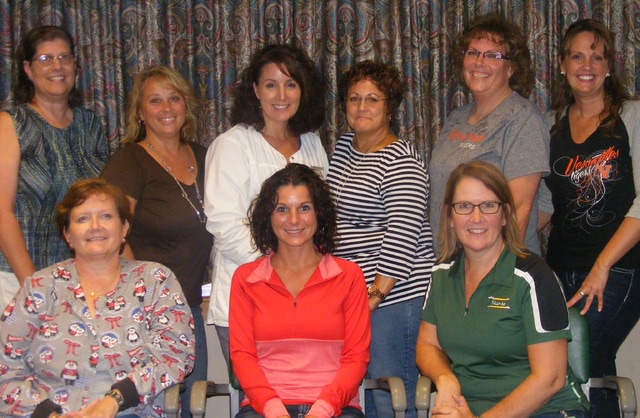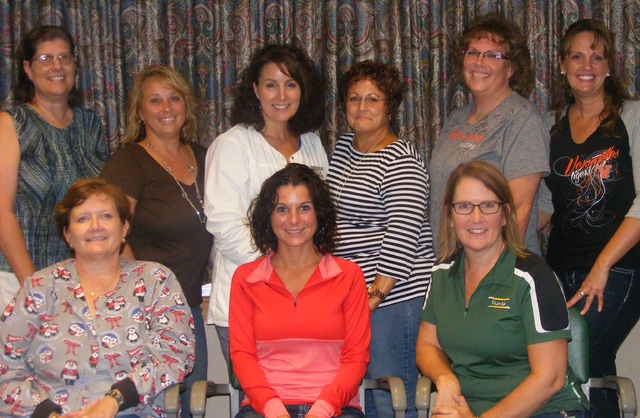

DARKE COUNTY — Eight Darke County school nurses and consultants get together once a month to collaborate, exchanging ideas from their own respective schools as well as from their profession.
Usually gathering at the Darke County Health Department, they are quick to announce their response when asked what a school nurse does.
“I work everyday to save lives and remove non-educational barriers in education,” is that response they agreed upon.
Those school nurses are Beth Shellhaas, in her eighth year K-6 at Greenville; Kathy Jetter, her seventh year for grades 7-12 at Greenville; Jodi Fritz, in her third year at Tri-Village; Terri Greve, 13th year at Arcanum; Susie Hileman, who has been at Covington for eight years with a total of 16 years in the profession; Amanda Fischer, her fourth year at Ansonia after having subbed there for four years; and Tracy Cordonnier, in her second year at Versailles but six years total. The two health consultants are Moniqua Skinner in her second year at Bradford and Brenda Crisman, 19th year at Franklin-Monroe.
Each one of them wears many hats during the course of the school year.
“We are our own entity because we are the only medical professionals working in our buildings,” said Fischer. “They are our own decisions to make.”
“That’s why we collaborate with each other once a month,” said Fritz. “School nursing is such a wonderful opportunity. We have that opportunity to make a difference and snowball with that. It just grows and grows.”
“We’re all inundated to keep teaching any new information,” said Shellhaas, who has been in nursing for 25 years. “It’s a phenomenal task to keep track of everything. We have to be organized. We are not only medical; we cover everything. We’re a social worker and the waitress who gets them to eat their breakfast in the morning. We’re cooks sometimes, and I’ve bought some students new clothes. We have to handle emergencies and get through situations without panicking.”
She also noted that they are all counselors, when it comes to such issues as suicide, drugs or pregnancy.
“We’ve all had to buy items and supplies for students,” said Skinner, who is in her eighth year in public school nursing.
Jetter agreed that education is a major part of her job.
“With something like getting them [students] to eat their breakfasts,” she said.
“It’s state law that if a child has health issues, we have to develop an action plan,” reported Hileman, who enjoys attending the Darke County meetings because they’re not offered in Miami County. “There are a lot of legal situations you have to be aware of. We have to do reports for Individualized Education Program plans. We work with the educators [teachers] to provide them knowledge. We’re the bottom troops that take care of the kids. We are child advocates…that’s a big thing.”
School nurses, the group said, are considered public health nurses thus work closely with the Darke County Health Department.
Hileman, who formerly served as a school nurse in Bradford, said school nurses have to be on top of all diseases out there.
“If we have infectious issue, we have to report it to the health department,” she said.
“The wellness part promotes it with students and staff,” said Greve. “It’s an awesome opportunity to keep them healthy.”
“We have to become experts immediately,” said Shellhaas. “We can call each other. We sometimes have barriers to do our jobs. We want to do our jobs but we get hindered.”
“We’re just a phone call away,” added Fritz.
“We are the wellness coordinators in our districts,” Fischer said. “I do a wellness program for staff through the health teacher. I set up flu shots and cholesterol screenings. Last year, we had an echocardiogram program done for staff. Staff asks us for advice and medical questions. There is no health teacher for K-6 at Ansonia, and the high school has a health class. I’m their teacher. I go into the classroom to teach them hand-washing, nutrition and talk about anti-tobacco issues.”
Fischer said she is finding it more difficult in recent years to get into the classes because the teachers are so busy with testing.
“Teachers don’t want to be interrupted,” she said. “I struggle to get into the classrooms sometimes because of that.”
Fischer said, with K-6, she has a walking program at recess.
“So many miles logged, they get a prize,” she said. “Sometimes I take them to the Y swimming or to the park at the end of the year. They have health work sheets once a month and can get a tiger ticket.”
And, perhaps one last thing….the school nurse/health counselor, is familiar with each and every student in her respective school.
“We know everyone of those students,” said Fischer, who subbed as a school nurse before going full-time four years ago. “There is no one else in that building who knows the kids like we do.”
Tracy Cordonnier, a nurse in Versailles, described school nursing as wonderful reward and challenging.
“The challenges are juggling the acute care of the students with the chronic medical condition students and the needs of the school community and providing educational opportunities to the students, staff and community,” she said.
Yes, school nurses are sometimes teachers, writers of policies and are always on call even when they’re attending meetings.
It was stated at Friday’s gathering that each school has its own board and own board rules and each nurse is governed by those policies.





